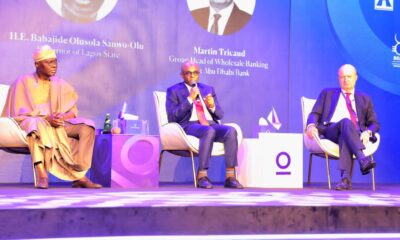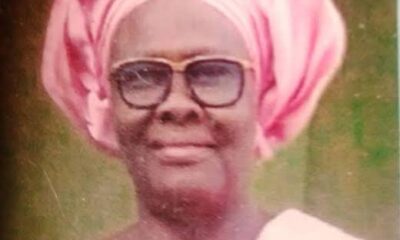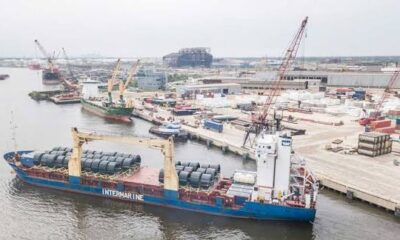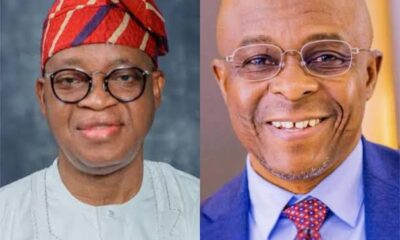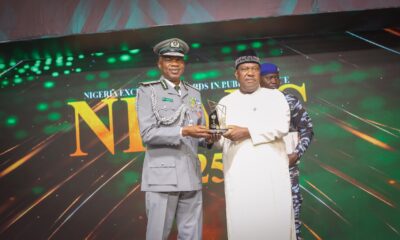Maritime
Escravos Seaport Project: Experts, Stakeholders Caution MMCC
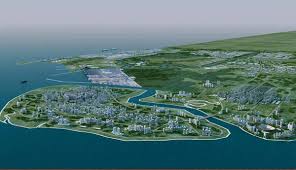
BY EGUONO ODJEGBA
The claim last week by Mercury Maritime Concession Company, MMCC, that the Delta Government had revalidated the approval of the controversial Escravos $27.2 billion Seaport project is generating fresh dust in the industry as experts and stakeholders expressed disbelief, while calling for caution to avoid stampeding the federal government into unwarranted action.
MMCC Chairman, Rear Admiral Andrew Okoja Rtd, reportedly told reporters Wednesday that what is being awaited following the Delta State purported re-validation is Federal Government’s counterpart validation, to pave way for the commencement of the project.
It will be recalled that following MMCC’s earlier allegation penultimate week that the federal government was delaying the takeoff of the project, the Nigerian Ports Authority, NPA, debunked the promoter’s claim, noting that the bid process was ongoing and frowned at the behaviour of the investment promoter.
Among other things, while Okoja claimed that his company has secured the project concession, he went on to say that MMCC has also found an international investor known as EDIB International of Hong Kong, which have expressed interest to commit $27.29bn to financing the project.
He however alleged that the Federal Government and the Delta State Government were delaying the project takeoff by withholding the necessary ‘final approval’ he says would enable MMCC and its foreign partner, EDIB International of Hong Kong to commence activities.
But reacting swiftly, NPA disputed the claims as misleading and capable of giving off potentially wrong signals to the investment world. While acknowledging that MMCC actually indicated interests in ESIC, the Authority noted that certain aspects of the company’s proposal were incompatible with the due process, open competition and fairness.
The Authority in a statement reads: “Mercury Maritime Concession Company Ltd, MMCC, submitted a proposal and wants Nigerian Ports Authority to approve its request as the only deep seaport-free zone in the eastern zone of the country for decades to come.
“The NPA received many proposals for developing deep seaports, including Ibom, Burutu, Bakassi, Bonny, and Port of Benin, which are currently at different stages of review.
“The initial phase involves acquiring land. The availability and suitability of the site are essential for the successful development of the port. This process is yet to be accomplished. Although the classic position is for the Authority to acquire the land and grant a concession on it to the private party, recent concessions granted by the government allowed private parties to acquire the land, hold it for an agreed term, and, after recovering the cost, transfer it to the Authority. Examples are the Lekki and Badagry deep seaports.
“To undertake this project, the site for the port must be identified, and environmental impact assessments and scientific studies must be conducted to confirm suitability.”
Providing more clarification, NPA notes that Mercury Maritime Concession Company is not close to sealing the deal and hence is in no position to force government to act arbitrarily and otherwise.“
Additionally, we must adhere to the PPP process as per the applicable law, which entails submitting the OBC and FBC, obtaining a Certificate of Compliance from the Infrastructure Concession Regulatory Commission, ICRC, and seeking final approval from the FEC. Therefore, we highlighted the need to submit a business and investment proposal with a financial model that demonstrates the project’s recovery period and forms the basis for adopting the PPP framework.
“It is crucial to emphasize that the port is just one aspect of the overall development of the Industrial Park. This development encompasses petrochemicals and various manufacturing facilities. The required approvals for these aspects are not within the Nigerian Ports Authority’s jurisdiction. They would follow the process under the ICRC Act.”
But MMCC went to town again last week claiming with the re-validation and validation narrative, which generated quite an amount of interest; in which MMCC’s attempt was described as desperate and unbecoming.
Speaking to journalists on the said revalidation, the MMCC Chairman said he has also received assurance from the Federal Government that the revalidation of the earlier granted provisional approval would soon be made.
His words: “We have received a revalidation from Delta State Government, which was communicated to us early this week. We are also in touch with the Ministry of Industry, Trade and Investment, the supervisory ministry for this project and they have assured us that the revalidation of the Federal Government would be granted before the expiration of the June deadline that the project financier gave us.
“The project will run across eight ministries including the Ministry of Solid Minerals, the Ministry of Works, the Ministry of Marine and Blue Economy and the Ministry of Power.”

He also assured that plans for the project financing has been taken care of, and disclosed that a Hong Kong based financial partner is on standby.
“The EDIB International of Hong Kong had expressed willingness to invest in the project as the financial partner for the port project that will be located on 31,000 hectares of land in Escravos (Gbaramatu Island/Omadino) Warri South-West Local Government Area of Delta State.
“The port project will open up Delta State and seven other states including FCT Abuja to international investors in the area of trade, commerce and industry. The project also involves building seven inland dry ports in Bayelsa, Imo, Delta, Edo, Kogi and Abuja and that all the deliverables would be achieved within five years of commencing construction,” he said.
Experts and stakeholders speaking on the matter in an online industry platform urged Okoja and his company to play by the rule and submit to the due process, rather than throw his weight around and attempting to throw spanners on the wheel of progress.
Alhaji Muhammadu Bauchi, not real name, a PPP expert said the validation and re-validation are unknown terminologies in project bids or concessioning.
“What is “validation”? PPP is a process. All projects would have to undergo necessary certifications as provided by law. The people shouting neither submitted an Outline Business Case, Business Plan, Technical Plan, even if conceptual; there was nothing submitted to enable the determination of their request. Things are not done in vacuum, and nobody can bully the federal government into inappropriate actions.”
Also commenting, erudite maritime security expert, Captain Warredi Enuisoh doubted claims by MMCC that would deliver on the project in five years, noting that a deep seaport is a huge project.
“A Port in Escravos could be operational in 5 years. But a Deep Sea Port in 5 years is quite an ambitious wish in the Escravos area, though. Unless the term “DEEP SEA PORT” is loosely used. I don’t think that even Lekki is a Deep Sea Port. I might be wrong, I doubt if it can host a fully laden Panamax sized ship.
“With a depth of only 6.2 metres, Escravos Bar will restrict heavy-laden ships and large ships from going there. I don’t think they involved professionals in their Outline Business Case. People come up with all these laudable ideas without surrounding themselves with grounded technical people.
“Have they thought of the underwater sea cables in the area? Have they started with the operators and owners of those facilities to relocate them? Who will pay for the relocation? Can they pay for the downtime of those underwater cables?
“They feel professionals will take the shine off them. In the process, the plot is lost as challenges come. If you think it through with seasoned people from the beginning, you will be better prepared to mitigate a lot of the challenge”, he remarked sympathetically.
President of the Nigerian Master Mariners, Captain Tajudeen Alao lamented that rather than optimize areas of comparative advantage, there has resulted an unnecessary rush for proliferation of seaports.
“Must every river outlet be a sea port? Do we need more than 3 smart ports in Nigeria? There’s nothing to export that will attract a Panamax sized Container Ship to some of these seaports except for empty containers. And you would require a good multi-modal transport network with solid regulations and enforcement regime.”
According to Dr. Eugene Nweke, a former President of the National Association of Government Approved Freight Forwarders, improperly planned seaports may gine room to unwarranted dumping.
“Deep Sea ports must be planned to serve various shipping needs. Proposing multiple deep sea ports projects without developing a strategic markets and freights places, is a misnomer’
Scoffing at the current rush as “a wind blowing across the ocean”, Nweke likened the prevailing agitation to “The sorry story of end to end shipping operations, consequently reducing our shipping space to a continental rated dumping ground for all manner of rickety endeavours.
“Any promoter no matter how inexperienced cannot envision a green Port development and delivery in 5 yrs period. Seriously, most of these proposed deep seaports are politically motivated. I remember Akpabio saying just before he left office then that Ibaka deep seaport will be ready before he leaves office.”

